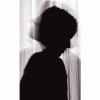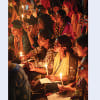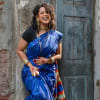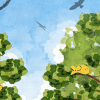After the rain

Again, I wasn't a poet, but words and sentences jumbled up seeing that small face, light make-up enhancing her beauty. A loose strand of hair cascaded down her cheek, framing her face. I had seen many of my female co-stars closely but found her face most beautiful. I was never accustomed to seeing such a thing. As I took the pen from her hand, I was shivering. God knows why, I didn't know what to write. I was so dazzled that I fiddled with the pen without signing anything. Perhaps she thought I was waiting to learn her name, perhaps I simply forgot how to write my own name. Hell, what would a person know who simply indulged in the privileges bestowed upon him? "I want an auto—" She gulped and couldn't finish the word, being nervous. For some moment I thought she was going to depart, leaving me as baffled as she was. Finally, she told me her name and her voice echoed off the walls and went straight into the deepest vault of my consciousness. It was like listening to a sonata, embodying love and pining in one great session. I took extra time to write the name on the snow-white tissue. Instead of leaving at that instant, she leaned forward, and the language of silence dictated us. I kissed her or she kissed me, or it was an effort from both. I can't be fully sure. Beads of sweat formed around her lips, shining like stars. I was so taken aback that I forgot to say anything out of courtesy.
Sweats, a little whiff of some cologne, varnished rail, her rattling fleet, a bangle on the wrist, black hair, the flashing light, the oncoming storm—is all I remember. I stood unmoved for a long time in that semi-darkness after she walked out into the rain. The last glimpse of her I had was through the glass window as I saw her friend pressing her arm in earnest, simultaneously rebuking her to know why she was so late. She told her nothing and the friend held out an umbrella, checking the time on her wristwatch. And the girl I kissed—and whose name I forgot—showed the friend something inside her purse that was enough to suppress the curiosity. I wondered if she told her about the silent kiss we both shared, the musical feelings we created. A brown Toyota Corona stopped in front of them. A white-capped driver rushed out, opened the door, and sped away. I stood alone, a wailing note in my heart, watching it pour outside, the trees dancing in the wind. One of the waiters eventually noticed me and showed me in, apologising for not knowing that I was to visit the club. He said something about phone calls and readying a table, but all I could hear was some noise. The music of that silent kiss was still so strong that I suppressed any other details in my mind.
I lost interest in everything I did in the following weeks. Those untrimmed eyebrows, slightly dimpled cheeks, the sheen on her forehead—all made me sleepless. I had no direction whatsoever in my life. Even in my dreams, I had a strong feeling for her when I saw the back of her. She was walking away in the rain or sometimes lying down on a bed with a book hiding her face. Oh, those frustrating dreams. I could never see her fully, her face never appeared once. It was always some limbs, legs or hands or lips or shoulders, but never her face. Even when I tried to forcefully imagine the face, I could only picture some outlines, more geometric in nature than a person's face. I gave up and turned to music, blasting symphonies in the evenings, then English, Bangla, and Hindi songs, whatever I fancied. S D Burman, Jagjit Singh, The Righteous Brothers, you name it. The songs and symphonies didn't improve my heart or feelings, only worsened them. I was racked with a desire to be loved, that I too, my small, insignificant self, could love someone back, was lovable. Yes, you are lovable. Pure nonsense—the hell I knew about love, raised in a loveless family, seeing parents fight and my father seldom coming home. I saw life only like a running track, a series of progresses and occasional rewards that it offered, only if one won. Falling in love with a girl whose face and name I couldn't remember was like going back to my adolescent years, that forever pining for things so pretty that inspired a child to love everything around him, wish good things for the world, bask in utopia, in other words.
I delayed my shootings; directors stopped by and were annoyed to reschedule. I even ignored the opportunity to work in a blockbuster melodrama where a blind genius tells his fawning lover how cruel fate befell him, how he couldn't achieve the greatest things in life due to an accident, which unbeknownst to him, was caused by the fawning heroine. Obviously, they picked their second choice, Razzak, for that role. I didn't care. I smoked cigarette after cigarette. I was frazzled, cheeks and eyes looking depressed. I had seen many beautiful girls throughout my career. Then I didn't see them anymore. I couldn't see anybody. It was as if the whole concept of love ended in one single individual, as if all my chases, contrary to my earlier belief, were to be doomed like this. Life was so unbearable without the presence of my beloved that I thought of harming myself, proving to myself how much I loved her. That absolute after-the-rain feeling never came back to me. That effect that I only experienced once in life was gone forever. I called the club for help, but without any name or facial description they failed to provide me with any leads, so one day I decided to do something desperate. I ran an anonymous advertisement on paper that read: To the girl I no longer know the name of. You were wearing a blue saree with a brocade blouse. You were two. I don't remember your face. One waiting out in the rain. Please drop a line to this address if you see this. I'm dying out of my breath for you.
I received no response from anybody. But several days later someone wrote a piece on the advertisement, calling me the city's new Romeo. It was so embarrassing, although the anonymous nature of the advertisement helped protect my reputation. The incident started to have some bearing on the public, with people sending me letters daily. So much so that my caretaker had to bundle them after sorting them by date, which I read carefully. It seemed that people claiming they were normal had a crazy side. One girl said she wasn't the girl I desired but she would take me to Paris, London, Bombay or any big cities in the world if we went on a date. Another offered a brand-new car and blue-collar job at her father's brokering house. A woman wanted to leave a loveless marriage to find happiness with someone like me even if she had to live out in the open or under a banyan tree for the rest of her life. The funniest was a poem with the same title the newspaper gave me where a girl told me how desperately she was in love with me, wearing a locket with my initials. Just imagine how crazy those people were. How would she even know my initials when I left no clues about my name? Anyway, one girl replied in a manner that I suspected might be the one I was in love with. After exchanging letters, I decided to meet her at the national museum. I asked my make-up artist to improve my appearance, to hide dark circles and puffiness around my eyes that gathered in months. I drove my Impala with the same excitement of the first day, thinking of the girl I was to meet and our secret kiss, a grafted memory, the beginning of my madness. I was at a loss as to what we could possibly talk about when we met. From my acting career, I realised it was easier to parrot dialogues in romantic scenes than to go on a date and tell a girl in an ordinary way the simple feelings of your heart. I knew the phases of our lives through the scripts and scenes I was challenged to embody—from a pining heart to a dying, ageing man, waiting for death. I saw it all, starring in many films in the past eight years, but in that car, thinking of my beloved, I forgot what I'd known. There would be no pretence, no acting as life itself called me for the first time in my wretched existence, to act with absolute honesty. And all I had to say was how much I loved her.
Undoubtedly, I was nervous. As I reached and saw the blue dot of beauty standing by the museum entrance—where we both agreed to meet—I was somewhat relieved to see the face of someone else—a completely different girl with a radiant face. I watched her carefully in case it was some stupid mistake on my end: lips slightly jutted out with a secret pout; sculpted cheeks and long black hair added an aura to her beauty. She even wore a blue saree and a blouse with a lace overlay, following the hints in my advertisement. She could have been the perfect girl for any man, except she wasn't the girl I sought. I turned back and drove back home without revealing myself, somewhat happy that I didn't have to express my feelings to a false person.
This is part two of the short story "After the Rain", to be serialised here at Star Literature.
Mir Arif is a Bangladeshi author living in Ohio. He is working on his novel, The Second Interpretation, while awaiting the publication of his story collection, Adrift. Find him @mirarif.

 For all latest news, follow The Daily Star's Google News channel.
For all latest news, follow The Daily Star's Google News channel. 








Comments